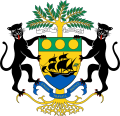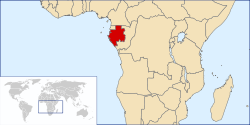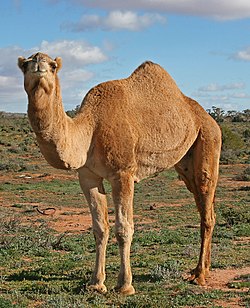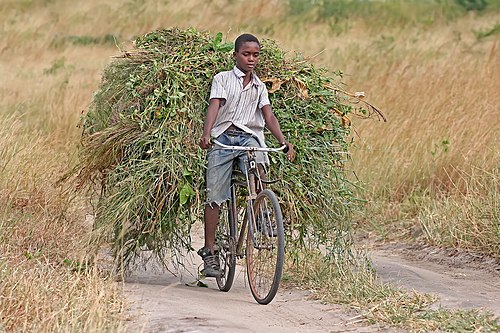Portal:Africa



Africa is the world's second-largest and second-most populous continent after Asia. At about 30.3 million km2 (11.7 million square miles) including adjacent islands, it covers 20% of Earth's land area and 6% of its total surface area. With nearly 1.4 billion people as of 2021, it accounts for about 18% of the world's human population. Africa's population is the youngest among all the continents; the median age in 2012 was 19.7, when the worldwide median age was 30.4. Based on 2024 projections, Africa's population will exceed 3.8 billion people by 2100. Africa is the least wealthy inhabited continent per capita and second-least wealthy by total wealth, ahead of Oceania. Scholars have attributed this to different factors including geography, climate, corruption, colonialism, the Cold War, and neocolonialism. Despite this low concentration of wealth, recent economic expansion and a large and young population make Africa an important economic market in the broader global context, and Africa has a large quantity of natural resources.
Africa is highly biodiverse; it is the continent with the largest number of megafauna species, as it was least affected by the extinction of the Pleistocene megafauna. However, Africa is also heavily affected by a wide range of environmental issues, including desertification, deforestation, water scarcity, and pollution. These entrenched environmental concerns are expected to worsen as climate change impacts Africa. The UN Intergovernmental Panel on Climate Change has identified Africa as the continent most vulnerable to climate change.
The history of Africa is long, complex, and varied, and has often been under-appreciated by the global historical community. In African societies the oral word is revered, and they have generally recorded their history via oral tradition, which has led anthropologists to term them "oral civilisations", contrasted with "literate civilisations" which pride the written word. African culture is rich and diverse both within and between the continent's regions, encompassing art, cuisine, music and dance, religion, and dress.
Africa, particularly Eastern Africa, is widely accepted to be the place of origin of humans and the Hominidae clade, also known as the great apes. The earliest hominids and their ancestors have been dated to around 7 million years ago, and Homo sapiens (modern human) are believed to have originated in Africa 350,000 to 260,000 years ago. In the 4th and 3rd millennia BCE Ancient Egypt, Kerma, Punt, and the Tichitt Tradition emerged in North, East and West Africa, while from 3000 BCE to 500 CE the Bantu expansion swept from modern-day Cameroon through Central, East, and Southern Africa, displacing or absorbing groups such as the Khoisan and Pygmies. Some African empires include Wagadu, Mali, Songhai, Sokoto, Ife, Benin, Asante, the Fatimids, Almoravids, Almohads, Ayyubids, Mamluks, Kongo, Mwene Muji, Luba, Lunda, Kitara, Aksum, Ethiopia, Adal, Ajuran, Kilwa, Sakalava, Imerina, Maravi, Mutapa, Rozvi, Mthwakazi, and Zulu. Despite the predominance of states, many societies were heterarchical and stateless. Slave trades created various diasporas, especially in the Americas. From the late 19th century to early 20th century, driven by the Second Industrial Revolution, most of Africa was rapidly conquered and colonised by European nations, save for Ethiopia and Liberia. European rule had significant impacts on Africa's societies, and colonies were maintained for the purpose of economic exploitation and extraction of natural resources. Most present states emerged from a process of decolonisation following World War II, and established the Organisation of African Unity in 1963, the predecessor to the African Union. The nascent countries decided to keep their colonial borders, with traditional power structures used in governance to varying degrees. (Full article...)
Selected article –

Pan-Africanism is a nationalist movement that aims to encourage and strengthen bonds of solidarity between all indigenous peoples and diasporas of African ancestry. Based on a common goal dating back to the Atlantic slave trade, the Trans-Saharan slave trade, the Indian Ocean slave trade, the Red Sea slave trade, along with slavery in the Dutch and British Cape Colony (now South Africa), the movement extends beyond continental Africans with a substantial support base among the African diaspora in the Americas and Europe.
Pan-Africanism is said to have its origins in the struggles of the African people against enslavement and colonization and this struggle may be traced back to the first resistance on slave ships—rebellions and suicides—through the constant plantation and colonial uprisings and the "Back to Africa" movements of the 19th century. Based on the belief that unity is vital to economic, social, and political progress, it aims to "unify and uplift" people of African ancestry. (Full article...)
Featured pictures –
Did you know (auto-generated) -

- ... that Mackay Davashe wrote "Lakutshona Ilanga", the English version of which, sung by Miriam Makeba, became the first South African piece to chart on the Billboard Hot 100?
- ... that Patrick Pillay negotiated Seychelles' re-entry into the Southern African Development Community with a reduced membership fee?
- ... that the South Australian Labor politician Ernest Roberts served two tours in South Africa during the Second Boer War?
- ... that land for a library built for African Americans in Virginia was donated by Pope Pius XII?
- ... that during the First World War the East African Mounted Rifles sometimes painted stripes on their horses to camouflage them as zebras?
- ... that Their Highest Potential shows the positive side of segregated schools, as written by a student who was taught in one?
Categories
Selected biography –
Hamidou Maiga (born 1932) is a Malian studio photographer among the region's pioneers in the craft during the postcolonial period. His work was largely unknown in the West prior to his discovery and display in the early 2010s. Maiga's early outdoor portraits from the Niger River region in the late 1950s reflect Mali's period of societal transition from colony to sovereignty. He has exhibited in solo shows in London and Lima, Peru. (Full article...)
Selected country –
 |
 |
|

| ||
Gabon, or the Gabonese Republic, is a country in west central Africa. It borders on Equatorial Guinea, Cameroon, the Republic of the Congo and the Gulf of Guinea. Since its independence from France on August 17, 1960, the Republic has been ruled by only two autocratic presidents; the incumbent El Hadj Omar Bongo Ondimba has been in power since 1967 and is currently Africa's longest-serving head of state. Gabon introduced a multiparty system and a new democratic constitution in the early 1990s that allowed for a more transparent electoral process and for reforms of governmental institutions.
Gabon has at least forty ethnic groups with separate languages and cultures, of which the Fang are generally thought to be the largest. A small population, abundant natural resources (including offshore petroleum reserves), and foreign private investment have helped make Gabon one of the most prosperous countries in the region, with a per capita income of four times the average for Sub-Saharan Africa, although the distribution of income from this industry is extremely unequal. (Read more...)
Selected city –
Ibadan (UK: /ɪˈbædən/, US: /ɪˈbɑːdən/; Yoruba: Ìbàdàn) is the capital and most populous city of Oyo State, in Nigeria. It is the third-largest city by population in Nigeria after Lagos and Kano, with a total population of 3,649,000 as of 2021, and nearly 4 million within its metropolitan area. At 3,080 square kilometres it is the country's largest city by land area. At the time of Nigeria's independence in 1960, Ibadan was the largest and most populous city in the country, and the second-most populous in Africa behind Cairo. Ibadan is ranked one of the fastest-growing cities in sub-Saharan Africa, according to the UN Human Settlements Program (2022). It is also ranked third in West Africa in the tech startups index. Ibadan joined the UNESCO Global Network of Learning Cities in 2016.
Ibadan is located in south-western Nigeria, 120 kilometres (75 mi) inland northeast of Lagos and 440 kilometres (270 mi) southwest of Abuja, the federal capital. It is a prominent transit point between the coastal region and areas in the hinterland of the country as well as one of Nigeria's most important commercial and research centres. Ibadan was the administrative centre of the old Western Region since the early days of British colonial rule, and parts of the city's ancient protective walls still stand to this day. The principal inhabitants of the city are the Yoruba people, as well as various communities (notably Igbo, Hausa, Edo, Ebira, Igede, Igala, Ibibio etc.) from other parts of the country. (Full article...)
In the news
- 4 May 2025 – Sudanese Civil War
- The Rapid Support Forces launch drone attacks on Port Sudan's international civilian and military airport. Drones also hit an ammunition depot at Osman Digna Air Base, causing damage but no casualties. (Al Jazeera)
- 3 May 2025 – South Sudanese Civil War
- At least seven people are killed and 25 others are injured in an airstrike on a hospital run by Médecins Sans Frontières in Old Fangak, Fangak County, South Sudan. (Al Jazeera English) (CTV News) (BBC News)
- 3 May 2025 –
- Togolese President Faure Gnassingbé is sworn-in as President of the Council of Ministers. Following constitutional reform that introduced a parliamentary system, this new post becomes the highest office in the government's executive branch. (BBC)
- 1 May 2025 –
- The bodies of three South African police officers who had been missing for six days are found in the Hennops River. (BBC News)
- 1 May 2025 – M23 campaign (2022–present)
- Authorities in the Democratic Republic of the Congo request the Senate to lift the immunity of former President Joseph Kabila to face trial on charges of supporting a rebel uprising. The Justice Minister alleged that there is was evidence implicating him in war crimes, crimes against humanity, and massacres of peaceful civilians and military personnel. (BBC News)
- 1 May 2025 –
- Kenyan parliament member Charles Ong'ondo is shot to death in Nairobi by unknown gunmen on a motorcycle in an apparent assassination. (BBC News)
Updated: 13:05, 5 May 2025
General images -
Africa topics
More did you know –
- ...that Iyabo Obasanjo-Bello, a Nigerian Senator from the People's Democratic Party, is the daughter of former President Olusegun Obasanjo?
- ...that the 2007 South Africa miners' strike, which impacted over 240,000 workers, was the first ever industry-wide miners' strike in the history of South Africa?
- ...that Seleh Leha, a town in Tigray Region in northern Ethiopia, was the site of a leprosarium built during the Italian occupation of East Africa and abandoned in 1941?
- ...that Sarir field, an oil field in Cyrenaica operated by the Arabian Gulf Oil Company (AGOCO), is considered to be the largest in Libya, with estimated oil reserves of 12 Gbbl (1.9×109 m3)?
Related portals
Major Religions in Africa
North Africa
West Africa
Central Africa
East Africa
Southern Africa
Associated Wikimedia
The following Wikimedia Foundation sister projects provide more on this subject:
-
Commons
Free media repository -
Wikibooks
Free textbooks and manuals -
Wikidata
Free knowledge base -
Wikinews
Free-content news -
Wikiquote
Collection of quotations -
Wikisource
Free-content library -
Wikispecies
Directory of species -
Wikiversity
Free learning tools -
Wikivoyage
Free travel guide -
Wiktionary
Dictionary and thesaurus


























































































